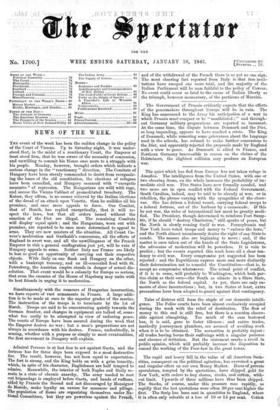Admiral Persano is at last free to act against Gaeta,
and the fortress has for three days been exposed to a most destructive fire. The result, however, has not been equal to expectation. The fort is strong, and the King holds on with a grim tenacity, which, in spite of his character, Englishmen are half tempted to admire. Meanwhile, the interior of both Naples and Sicily re- main in a state of chronic anarchy. The army needed to root out brigandage is employed before Gaeta, and bands of ruffians, aided' by Francis the Second and not discouraged by Monsignor de Merode, make loyalty an excuse for massacre and pillage. The population of Rome are organizing themselves under Na- tional Committees, but they are powerless against the French,
and of the withdrawal of the French there is as yet no one sign. The most cheering fact reported from Italy is that free insti- tutions have escaped one more trial, and the majority of the Italian Parliament will be men faithful to the policy of Cayour. No event could occur so fatal to the cause of Italian liberty as the triumph, however momentary, of the partizans of Mazzini.


























